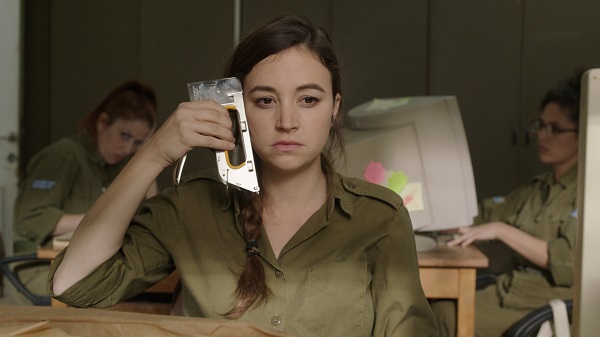Tribeca Reviews — The Absurdity of Life: Talya Lavie’s ‘Zero Motivation’

Pictured: Daffi played by Nelly Tagar in “Zero Motivation.” Photo Credit: Yaron Scharf.
Ricky Gervais move over. There’s a new boss in town, and she’s bound to kick your British snark across six country borders and land you in the middle of a desert with a limited supply of staple guns — sorry, there will be no Jell-O moments. Zero Motivation, the first feature film for writer and director Talya Lavie, is a raucous portrayal of office life within the Israeli military. And Officer Rama, played by Shani Klein with the gusto of an army general, truly puts Gervais’ David Brent to shame.
Lavie was awarded the best narrative feature and the Nora Ephron Prize at the Tribeca Film Festival on Thursday. The jury declared Lavie a “new, powerful force,” whose film depicted “women who must find their place and establish their identity in a world normally dominated by men and machismo. They do so with humor, strength and intellect. The filmmaker mirrors these same qualities.”
In exploring the tedium of office life — a theme made popular by Douglas Coupland’s Generation X, in which he coined the terms “sick building syndrome” and “veal-fattening pens”; the British and American sitcoms, The Office; and Mike Judge’s Office Space — Zero Motivation is the millennial’s answer to youthful angst, bureaucratic ineptitude, and solipsistic bosses. Teetering between light and dark, profound and profane, the film is the pinnacle of the absurd. From ballet dancing coffee service, to getting drunk on grape juice, to offices stuffed with shredded paper, to war with office supplies, Lavie doesn’t miss a beat in drumming up ridiculous scenes to offset the darker themes haunting the base.
Drawn loosely from Lavie’s own experiences, the film is a coming-of-age story stifled by the restrictive environment of mandatory military service. Fraught with ennui and grandiose aspirations, Zohar, the office Postal NCO, played with brassy verve by Dana Ivgy, and Daffi, the “Paper & Shredding NCO,” performed by the effervescent Nelly Tagar, spend most of their time playing Mind Sweeper and rattling Rama’s brass-pining cage. At the heart of the story is their friendship, begging the question: are there certain points in one’s life when a friendship exists not because there is a genuine connection, but because of situation?
While Rama strives to rise within the male-dominated ranks of the Israeli military, her secretary pool — complacent, if not insubordinate — risks her promotion at every turn. Zohar, Rama’s arch nemesis, bides her time spewing sarcasm and cutting holes in her commanding officer’s uniform, while Daffi goes over Rama’s authority to receive a transfer from the desert base to Tel Aviv, where she dreams of becoming a metropolitan woman. The brilliant cast balances the comedic and the ghastly (there is a suicide and sexual assault) at every turn, keeping the audience in suspended belief that one of the most powerful military forces on the planet could actually operate at such a sophomoric level.
Ivgy, who won an Israeli Film Academy award for Best Actress in 2003, dominates the screen with such a casual performance that it feels more documentary-like than scripted. Her character seeks, as Farah did in Meera Menon’s Farah Goes Bang — winner of the Nora Ephron Prize at Tribeca last year — to lose her virginity before “it’s too late.” Zohar learns, painfully, as many do when on a quest, that forcing life is, itself, absurd — her friendship with Daffi fractures; she’s thrown in jail; and her yen to “become a woman” reaches a dangerous turning point.
Despite a nearly all-female cast, Lavie has succeeded in making a film that will appeal to both genders. Her storytelling evokes emotional turbidity and gratification experienced in civilian and military life for men and women. And while there’s no doubt that co-ed troops can create a variety of challenges, Lavie doesn’t offer solutions as much as she opens the door for comic relief. Playwright and critic, Martin Esslin, writes, “The shedding of easy solutions, of comforting illusions, may be painful, but it leaves behind it a sense of freedom and relief. And that is why, in the last resort, the Theatre of the Absurd does not provoke tears of despair but the laughter liberation.”
Lavie, with her first film, seems to have understood the essence of the absurd, and then some.
Rating: 4 out of 4 stars
“Zero Motivation” had its world premiere at the Tribeca Film Festival (April 16-27) this past week. The film can be seen on the following dates: Sunday, 4/27 at 3 p.m. at Bow Tie Cinemas Chelsea 7; Sunday 4/27 at 6 p.m. at Bow Tie Cinemas Chelsea 7. For information about the film as well as where to purchase tickets, please click here.

